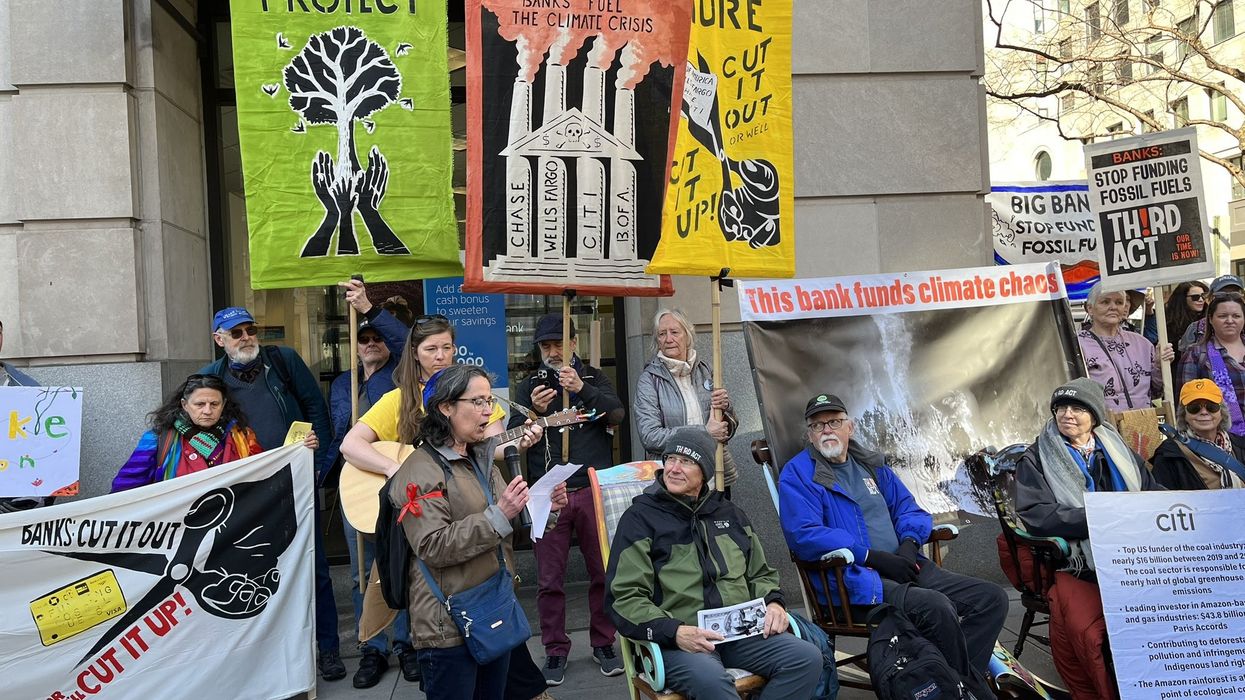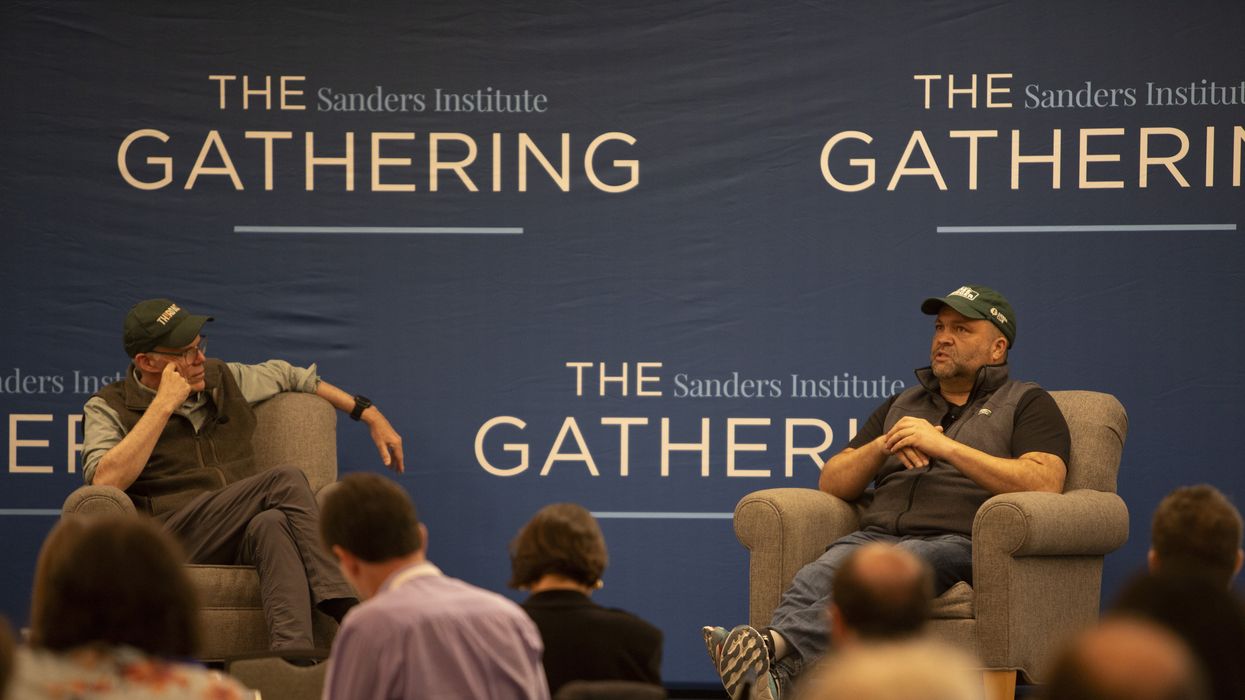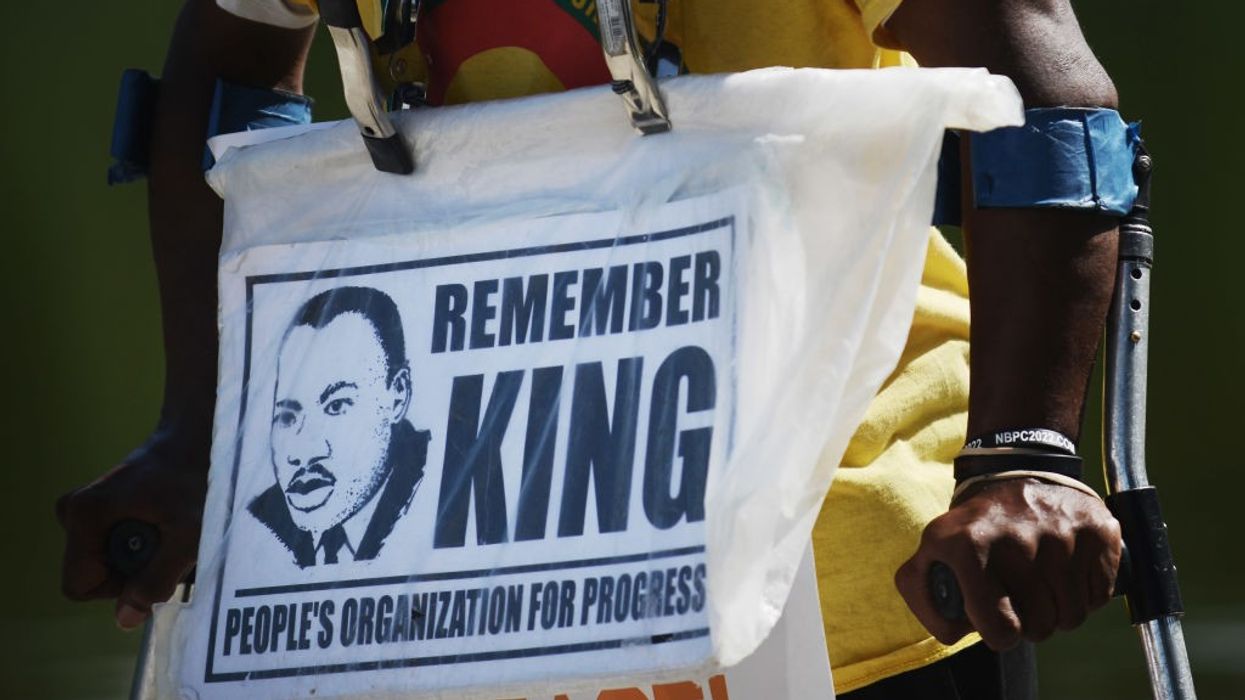"In order to win, we need to go on the offensive," said Minden, "because defense has not been working."
Playing offense against the incredibly powerful and well-funded fossil fuel industry requires growing the movement and seizing political opportunities to implement lifesaving policies, according to experts and organizers who participated in a series of panels focused on the climate crisis.
One of those opportunities that campaigners are already gearing up for is the January 2026
expiration of tax cuts signed into law in December 2017 by then-President Donald Trump, the presumptive Republican nominee for the November election.
Speaking alongside Minden on the
livestreamed panel, Friends of the Earth (FOE) president Erich Pica described the looming fight as a "Tax Super Bowl" that will take place shortly before the next president is sworn in. The climate movement is organizing aggressively to show just how much U.S. consumers and taxpayers are being ripped off by the greed of the fossil fuel giants that enjoy massive federal subsidies and enormous tax breaks despite the "eye-popping" profits they post year after year.
"We know that there will be a tax bill that, if it is not passed, will end up increasing taxes on all individual Americans. And so we have an opportunity for 18 months to organize, to take out the oil and gas industry," Pica said.
Trump in April made a
reported quid pro quo offer to fossil fuel executives: Pour just $1 billion into his current campaign, and he will repeal climate policies implemented under Democratic President Joe Biden, who is seeking reelection.
Pica pointed out that Big Oil—which has benefited from federal tax breaks since the Revenue Act of 1913—could profit handsomely by taking Trump up on his offer, if the Republican returns to the White House. In an analysis
published last month, FOE Action found that the industry fueling the climate emergency could see an estimated $110 billion in tax breaks alone if Republicans get their way.
Throughout the weekend, multiple panelists highlighted the End Polluter Welfare Act recently
reintroduced by Rep. Ilhan Omar (D-Minn.) and Sen. Bernie Sanders (I-Vt.)—whose wife Jane O'Meara Sanders and son Dave Driscoll co-founded the Sanders Institute. The legislation aims to close tax loopholes and end corporate handouts to the fossil fuel industry, and the sponsors estimate it would save American taxpayers up to $170 billion over a decade.
The bill's reintroduction last month was "an important step," said Joseph Geevarghese, executive director of Our Revolution, an organization that grew out of the senator's 2016 presidential campaign. "The thing is, we need a movement and a strategic opportunity to be able to get that policy over the finish line."
Some panelists argued that the moment is now, but the movement must expand beyond what Rev. Lennox Yearwood, president and CEO of the Hip Hop Caucus, said is, "at this time, a siloed, segregated, progressive climate movement."
Americans are not only "dying because of the climate crisis" but also paying fossil fuel companies "to kill us," Yearwood told the audience. "Their business plan literally means a death sentence for our communities."
"The issue on taxation," he explained, "allows us to once again broaden our movement, allows us to go to Republicans, go to Democrats, to go to Independents, and go across this country... and say simply: 'Your tax dollars are going to go to those who are rich and are killing our communities. Do you want that?'"
Another way to grow the movement is to include communities—especially those historically represented in politics by Big Oil beneficiaries—in the global green transition.
On the Gathering's opening night, which was also
livestreamed, Sierra Club executive director Ben Jealous, also a Sanders Institute fellow, spoke about recently visiting a plant where workers make solar panels in the district of far-right Congresswoman Majorie Taylor Greene (R-Ga.), a major Trump ally.
While touring the Hanwha Qcells solar facility in Dalton, Jealous asked about a wall of drawings and paintings. He learned that they were created for Earth Day last year by children of the employees, who were asked to portray "how they see their parents working at this factory."
"In maybe the most, arguably the most conservative congressional district in America," workers' children "portrayed their parents as heroes saving the planet," he said. "The kids in that district get that we need solar panels, get that we got to work together to save this planet. There's reason to be hopeful."
The plant's South Korean company
has been able to grow because of the Inflation Reduction Act (IRA) that congressional Democrats passed and Biden signed in 2022. While members of the climate movement have long framed the law as a flawed but still historic package in terms of tackling the planetary emergency, with the general election mere months away, speakers at the Gathering stressed the need to showcase such progress to voters nationwide.
"We really do have to take those moments when something happens and claim it. And partly that means in this election being willing to say how important that IRA was," said panelist and Sanders Institute fellow Bill McKibben, who founded Third Act, which organizes elders for climate advocacy.
"Was it perfect? Not even close… but it was in some other sense, remarkable," he continued. "We've got to actually talk about that enough that people understand it. And truthfully, we don't… Certainly, the Democratic Party does not a good job of talking about those things in those ways."
Also pointing to the Georgia solar plant, McKibben added that "one of the things that's really brilliant about the IRA is that the bulk of the money is going to red state America to do this work, which is not something that we're used to anymore in our country... people being willing to do anything other than support their own supporters. And it's a remarkable possibility for a kind of political healing going forward."
No matter the outcomes of the upcoming U.S. congressional and presidential elections, climate campaigners are committed to the fight against fossil fuels. As Pica put it, "I think we have to wage the fight regardless."
"The oil and gas industry has been operating with impunity for over a hundred years," the FOE leader said. "They're crushing our politics, they're polluting the climate, and they're getting away with it."
"We discovered during the Inflation Reduction Act fight, when there was a real effort to repeal the oil and gas subsidies, that they expended a lot of political capital to keep those subsidies in place," he noted. "The fact that we can wage a campaign that forces the oil and gas industry to expend political capital to maintain their largesse from the federal government, regardless of if we win or we lose, is a winning strategy for us."
"'Cause that means they're not trying to repeal the stuff in the Inflation Reduction Act. That means that they're not trying to work on reducing… their corporate taxes," he explained. Like Minden, Pica wants the climate movement to make the fossil fuel industry finally play defense.
The End Polluter Welfare Act "is the organizing vehicle," Pica said. "We've gotta get support behind it. We've gotta get members of Congress on it. We've gotta get community activists out there in the streets."
The organizers battling Big Oil underscored the urgency, emphasizing that not only are the Trump tax cuts set to expire soon, but also communities across the country and around the world are already enduring the effects of a hotter planet—including rising sea levels, more destructive storms, extreme temperatures, devastating floods, and raging wildfires.
"A hundred years from now really matters. But also what's going on today and in the next five years really matters," said Minden. "I think within the next five years… our world's gonna be pretty unrecognizable in many ways."
The 21-year-old climate campaigner told the Gathering's audience—full of academics, advocates, policymakers, and more—that "whether you're here working in healthcare or income inequality or labor, the reality is that this issue is about to become a part of your work, if it's not already."
"I know we all have our own fights. I know everyone here is working on things that are really, really important. But if we don't all go out on this fight, if we don't all go out on climate, we're gonna get taken out," she warned. "It's a matter of survival."




